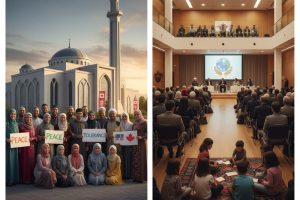Canada is home to a vibrant and diverse Muslim community that actively contributes to society through faith-based giving. From food banks and shelters to international relief work, charitable efforts rooted in Islamic values continue to create meaningful change. Supporting an Islamic charity Canada initiative does more than fulfill a religious obligation—it uplifts communities, fosters unity, and addresses pressing social issues locally and globally.
In this article, we’ll explore how donations to Islamic charities are used, the difference between zakat donations and Sadaqah Canada contributions, the role of Muslim non-profits, and why your support matters now more than ever.
The Importance of Charity in Islam
Charity is one of the core principles of Islam. Muslims are encouraged to give generously, not only to fulfill religious obligations but also to cultivate empathy and strengthen communities. The Qur’an emphasizes supporting the poor, the needy, and those struggling under financial hardship.
In Canada, Muslims carry this tradition forward by supporting local and international organizations that provide aid, education, healthcare, and poverty relief. These charities function as vital links between donors and beneficiaries, ensuring that funds reach those who need them most.
Understanding Zakat and Sadaqah
Zakat Donations
Zakat is one of the five pillars of Islam and is mandatory for all eligible Muslims. Each year, Muslims donate 2.5% of their qualifying wealth to support those in need. In Canada, many charities offer Zakat-specific programs, ensuring that funds are distributed in accordance with Islamic guidelines.
Zakat donations typically support:
- Food assistance for low-income families.
- Debt relief for those in financial crisis.
- Aid for refugees and displaced individuals.
- Emergency relief in times of natural disasters.
Sadaqah Canada
Unlike Zakat, Sadaqah is a voluntary charity given at any time and in any amount. It can be financial, material, or even an act of kindness. Many Muslims in Canada contribute to Sadaqah Canada initiatives as a way to consistently give back. Examples include donating to build wells, sponsoring orphans, supporting schools, or funding medical treatments. While Zakat follows specific guidelines, Sadaqah offers flexibility for ongoing, everyday acts of generosity.
The Role of Muslim Non-Profits in Canada
Muslim non-profits are at the heart of charitable work in Canada. They operate food banks, community centers, refugee settlement programs, and international relief initiatives. Beyond providing aid, these organizations also focus on education, advocacy, and interfaith engagement, helping build stronger communities.
Some notable areas where Muslim-led charities contribute include:
- Local Support: Free meals, clothing drives, and shelter services for low-income Canadians.
- Youth Development: Scholarships, mentorship, and after-school programs for young Muslims.
- Health Initiatives: Mental health programs, wellness workshops, and access to healthcare resources.
- Global Relief: Sending emergency supplies to areas impacted by war, famine, or natural disasters.
By donating to an Islamic charity in Canada, you support organizations that not only provide immediate assistance but also build long-term solutions.
How Your Donations Make a Difference
- Feeding Families: Thousands of Muslim charities across Canada operate food banks and meal programs. For many low-income families, these services are a lifeline.
- Supporting Refugees: Canada welcomes thousands of refugees annually, and Islamic charities help them adjust by providing housing, employment support, and cultural integration services.
- Emergency Aid: During global crises such as earthquakes or floods, Muslim charities mobilize quickly, sending funds, food, and medical supplies abroad.
- Education Programs: Donations help fund Islamic schools, tutoring services, and scholarships that empower the next generation of Canadian Muslims.
- Healthcare Assistance: Charitable programs often cover prescription costs, counseling, and medical treatments for uninsured or underinsured individuals.
Accountability and Transparency in Islamic Charities
One common question donors ask is whether their contributions truly reach those in need. Reputable Islamic charity organizations prioritize transparency. Many provide annual reports detailing how funds are collected, managed, and distributed.
Before donating, always verify:
- The charity is registered with the Canada Revenue Agency (CRA).
- The organization provides clear financial statements.
- Zakat-specific funds are separated from general donations.
By choosing accountable organizations, you ensure your contributions are used responsibly and effectively.
Tax Benefits of Giving in Canada
An added advantage of donating in Canada is tax relief. Most registered charities issue tax receipts that can reduce your overall tax bill. Many donors are pleasantly surprised to learn that zakat donations qualify for charitable tax credits when given through a registered Canadian charity. This not only amplifies the impact of your giving but also allows you to redirect more resources to meaningful causes.
Stories of Impact
- Local Example: In Toronto, Muslim-led charities distribute Ramadan food baskets each year to thousands of families, ensuring they can observe the holy month with dignity.
- National Example: Charities in Alberta and British Columbia have worked with wildfire victims, providing housing and essential supplies when disasters struck.
- Global Example: Canadian Muslim non-profits regularly partner with international NGOs to deliver clean water, build schools, and provide healthcare in underserved regions worldwide.
These stories highlight how every dollar given to an Islamic charity Canada program translates into real, measurable change.
How to Choose the Right Charity
With so many organizations to choose from, how do you decide where to give? Consider these steps:
- Identify your giving goals (local vs. international impact, Zakat vs. Sadaqah).
- Research registered charities through the CRA database.
- Check for transparent reporting and community reputation.
- Start small and build trust by reviewing their results.
By taking time to evaluate, you’ll ensure your contributions align with both your values and the needs of the community.
The Future of Muslim Charities in Canada
As the Muslim population in Canada grows, so does the impact of charitable giving. Technology now makes it easier than ever to donate online, set up recurring contributions, or support crowdfunding campaigns. Many charities are also embracing digital tools to increase transparency, reach wider audiences, and engage younger donors.
In the future, we can expect more collaboration between Muslim non-profits and broader Canadian charities, creating opportunities for interfaith initiatives and nationwide social programs.
Conclusion
Supporting an Islamic charity Canada initiative is more than a donation—it’s an act of faith, compassion, and social responsibility. Whether you give through zakat donations or contribute to Sadaqah Canada programs, your generosity directly supports struggling families, empowers youth, and builds stronger communities at home and abroad. From food banks in Toronto to international relief missions, Muslim charities are making a tangible difference every day. By giving wisely, you not only fulfill your religious duties but also contribute to a Canada that thrives on inclusivity, empathy, and hope.
FAQ’s
Q1. What are the top Islamic charities in Canada?
A: Some of the top organizations include Islamic Relief Canada, Human Concern International, and National Zakat Foundation Canada. Each supports local and international projects, from food banks to global relief efforts.
Q2. Is zakat tax-deductible in Canada?
A: Yes, if your zakat donations are made through a registered Canadian charity, you can claim them as tax-deductible contributions and receive charitable tax credits on your return.
Q3. How long is the Ontario G driving test?
A: The Ontario G road test typically lasts 30–40 minutes. It includes highway driving, lane changes, parking maneuvers, and city driving assessments to ensure full competency on the road.



